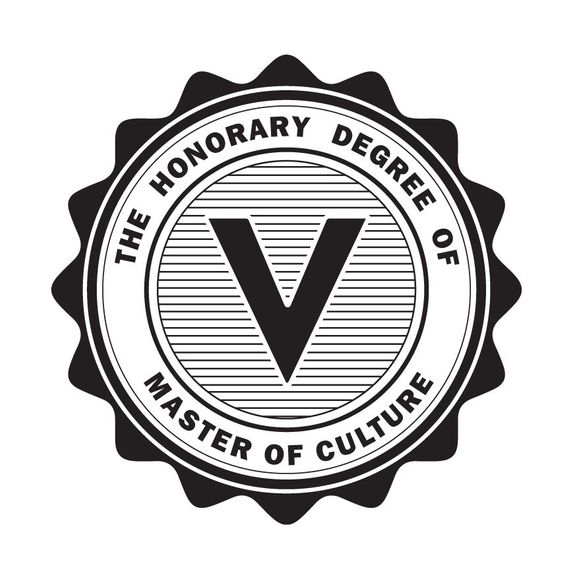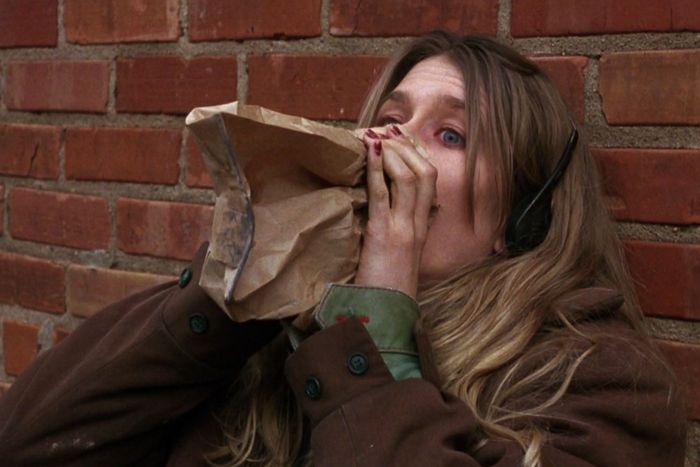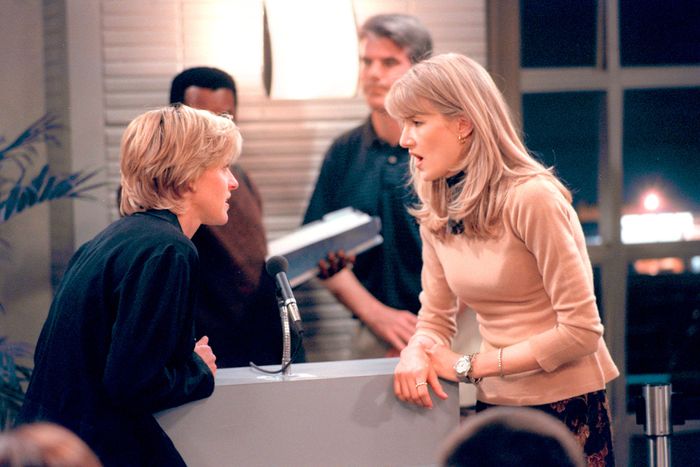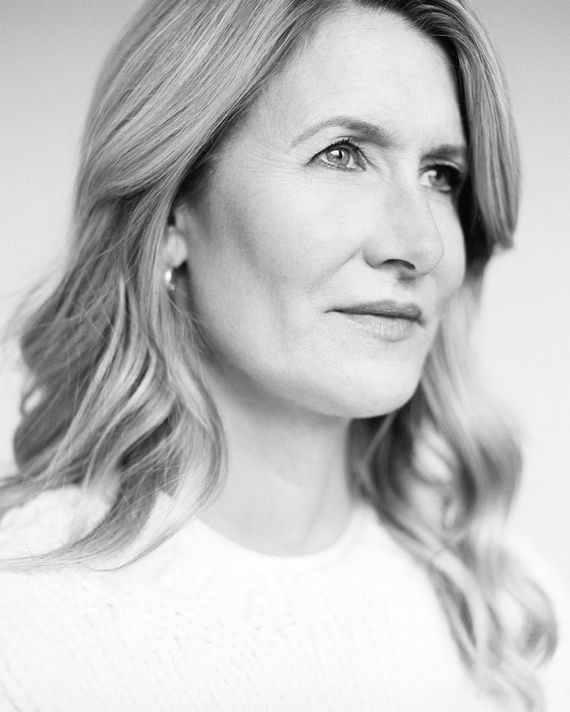
After shooting the 1985 film Smooth Talk, Laura Dern’s co-star Treat Williams, who was twice her age, said something prescient: “I think the next few years are going to be hard for Laura. She’s not as salable a persona. She’s not so easy to categorize. So I see a longer path for her, but ultimately a more rewarding one … There’s something much deeper in her than you can find in most actresses her age.”
This is to say that, when most actors her age zigged, Dern, who was then 16, zagged. She turned down a role as the love interest in a Brat Pack-era movie in favor of doing a smaller part in Peter Bogdanovich’s Mask about a child suffering from lionitis. Instead of completing a BA at UCLA, she took part in David Lynch’s Blue Velvet, which then led to her role as Lula, the sexually confident woman voraciously in love with Nicolas Cage in Lynch’s follow-up, Wild at Heart. Whether she was playing the drug-addled mother at the center of a national abortion controversy in Alexander Payne’s 1996 film Citizen Ruth, the prickly social-justice warrior Amy Jellicoe in Enlightened, the 2011 HBO series she co-created with Mike White, or the furious one-percenter Renata Klein in Big Little Lies, her choices have always felt slightly ahead of their time.
So it’s fitting that we at Vulture would bestow our first totally real and extremely legitimate honorary degree in culture to Laura Dern. In a one-hour conversation at Vulture Festival in New York, we discussed the path she’s carved out for herself, including her work with Lynch, the fallout from shooting Ellen DeGeneres’ coming-out episode, and imagining what her career would have been like if she had been male.
Read More: Bilge Ebiri on Why We Picked Her
Congratulations on your degree! Do you feel wiser?
Definitely. When I was 17, I went to college [at UCLA], and on day two, I got cast in a movie. And I was desperate to do this movie. They said, “You can’t get a leave of absence, it doesn’t work that way, you can’t leave.” So I went to the head of the film department. They said, “We want to read the script, we want to hear how long it’s gonna take.” So I gave them all the information, and at the end, they read it and said, “Not only are you giving up your college career if you go make this film, but we can’t believe you would want to do this movie anyway.” That movie was Blue Velvet, and now, when you go to get your master’s in film at that school, three movies are musts — one of them is Blue Velvet. But I never got a degree until now.
Your mother is Diane Ladd; your father is Bruce Dern; your godmother was Shelley Winters. I assume your childhood was very normal for you, but could you paint a picture of what it was like growing up around really committed and serious actors while becoming interested in acting yourself?
We all normalized our childhoods. You know, we had to. So however complicated it was given the dynamics in the household, we only learn as adults what was going on with deeper understanding. So with that said, I feel like mine was as normal and as crazy as everybody else’s now that we’re grown-ups having dinner. I find myself radically lucky because I was raised not only by people who considered themselves craftspeople at a job, but at a time pre-social-media and pre-actors-on-the-cover-of-magazines. There were models who were on the covers of magazines, and actors who you saw on Johnny Carson. That was it. There was Film Comment or American Film Magazine, and maybe an actor would do an interview and that was it. And so, I never grew up around a glamorous childhood. My parents didn’t make a great living, just like anyone in the arts. The kids of artists in L.A. were not the wealthy kids at school. We were workers. And I’m really grateful for that. It really prepared me for an understanding of the ebb and flow of the career of an artist.
What do you make of the shift in pop culture powered in part by stan culture on social media. Actors are on the covers of magazines now. Do you think it has been bad for the craft?
I wouldn’t say it’s bad for the craft, but it can be bad for an individual, right? It’s hardest for a really young person to come into great success now than maybe before because our standards have changed. We’re now measuring success on a number of followers. We’re having conversations with 14-year-olds who are famous from a Netflix or HBO show about branding and marketing them. That, for a young artist, is a real slippery slope, and I’m very impressed at the people who can navigate it healthfully. In whatever any of us do — journalists, actors, writers — if you’re in the arts, it’s a thing you don’t measure. There’s not a finish line. You don’t get graded; you just gotta do your thing, and there’s no right or wrong in this elusive exploration of the truth. That felt really cool. And now suddenly, it’s like, “Oh, well they only have this many,” or “it only made that much,” or “there’s only that viewership, and well it’s not paid whatever.”
You always seemed to have this really precocious clarity about the work you wanted to do. In an interview in 1986, you said, “I’m getting quite a few offers, but many of them are teen exploitation films, which I don’t want to do. There are a couple things that I’d love to do, but I’m still a little young to play 30. I can’t do those Meryl Streep-type roles yet. What matters most is I play someone totally different than what I’ve done before. I always want to play bright people. I’d like to play someone involved in politics, sort of a woman’s version of Mr. Smith Goes to Washington, and I’d like to play a strung-out drug addict who sleeps with a different guy every night. My God, I’d like to play everything.” I’m curious to hear you talk about what your expectations were at that age, and how that compares with what has happened in reality. Did it meet your expectations? Has it yet to? Did your expectations change?
All of that and more. It’s funny — what’s naïve when we’re 16, 17, and what is still us. I still try to play things I’ve never played, or really want to play the opposite the next time. It was a particular passion of mine at that age because it was the first time I started talking to my dad about career choices as an actor. He felt burdened by having been typecast and pigeonholed because he was the guy who killed John Wayne in this film The Cowboys. He was on the cover of Life magazine, “The Man Who Kills John Wayne.” He loved it and it was great, but then he was the bad guy in movies for a while. So he gave me that cautionary tale. That has really served me when I’ve been lucky enough to have a choice.
But where has it not? I don’t know. I think there’s a sea change, culturally, that we’re all waking up to. Many have been awake for a very long time, but as a culture, we’re waking up together. It’s about representation and gender and diversity parity, and we’re having these conversations in the arts, but they’re having these same conversations in marketing. And the reason they are isn’t because [of] #MeToo. “We’re all awake now. We want to do the right thing.” No, it’s because the consumer is saying to everyone, “We want to buy ourselves. We want to buy our own stories. Whether we’re watching TV or we’re buying an anti-wrinkle cream, we don’t really want a 19-year-old who’s also been airbrushed to sell it to us. I want a 60-year-old woman!”
I’m not 60. it’s not a bad thing, I’m just not ready yet. [Laughs.]
What were some of the things you turned down, when you were trying to manage the limited choices you had at the time?
Turned down, or hoped I wouldn’t get, even though I auditioned for them. You know what I mean? There were those moments too.
Like what?
Well, never say names. Only because, like, it was meant to go to that actor, and I feel like then it muddies the water of like — don’t you guys hate that, when somebody’s like, [scoffs]?
No, I love tea.
I mean, it’s interesting, but it’s also a little mean. “Oh, it’s so interesting she did that, but I turned that down.”
Well, if you say it like that!
I read an actress’s interview recently; she did say it like that. It was like, You don’t have to let everybody know how many things you’ve been offered! Listen, hand-me-downs are awesome! But definitely there were choices. The one biggest choice was, there was a Brat Pack-era film where I got offered the girlfriend part, the lead female. It was a big deal, and it was going to be great in terms of success. That was clearly the role. And then I got offered this small role to work with Peter Bogdanovich in Mask. And if I didn’t have my parents, I wouldn’t have known how lucky I was to work with Peter Bogdanovich. Because the agent goes, “Well that’s no money; that’s lots of money.” And you’re a kid and you don’t know for sure. I was 15. Those kinds of choices really helped shape the trajectory of where I hoped to go and partly where I am now. But in the quote, it’s clear I want to play everything. I have no judgment, and I think that’s true. I’ve loved all my characters, even the drug addict who slept with a different guy every night.
Citizen Ruth?
Yeah. And I don’t think, at 17, I realized just what I was asking for. I was like, “No, she takes cute drugs.” With other actresses we talked about some of the parts where it was like, “she’s so cute!” while she’s whoring herself out or whatever — in an adorable way. The always forgiving girlfriend who has no voice in the relationship, and he goes and sleeps with like, the nasty girl, but then he comes back to her, and she’s so lucky — I was ready to play [those kinds of parts] because I was auditioning for everything. But something inside you is like Ugh, this is not the story I want to tell, because this doesn’t feel true.
You were emancipated at the age of 17 …
Sixteen, and it’s an uninteresting story, because everybody’s like, “Oh my God!” The drugs and alcohol in her home was so painful for her that she had to flee or whatever. Because it’s used properly for teenagers that need to get away. But mine was honestly about having the ability to work and make my own decisions in terms of work and hours and all of that.
I read that your roommate was Marianne Williamson at the time?
That’s true, yeah. Amazing.
What was that like?
Amazing. Marianne was teaching A Course in Miracles at the time, and in our living room there were prayer group sessions and everything. She is such a fierce advocate for not only the truth and cutting through things to find the truth, but also, focusing on healing. She should be a voice in this country because we need voices like that. In our living room, she helped start Project Angel Food, which was extraordinary. It was the mid-’80s and people were dying of AIDS. She’s always been on the frontlines like that. She’s radical and hilarious. I was 17, she was in her 30s, I think, at the time. So it was like, amazing and hysterical that my overprotective mother, who was like, “You’re gonna go out there and find a roommate and be on your own, and I don’t know if you’re ready.” And I was like, “Mom, trust me.” And I was like, “Ahhh, I’m gonna get my own apartment, I’m gonna be wild,” and I basically roomed up with a minister! Who was very free and helped me grow as an individual, but it wasn’t like, you know, ragers every night.
Do you support her candidacy for president?
I support every candidate for president in the Democratic party right now in that I like it loud, I like conversation happening, and I think the more it’s happened with a number of people as opposed to focusing on our one shot, the dialogue is getting more honest. As we’re educating ourselves, it’s separating out what feels true and what we need. I had the good fortune of meeting Beto [O’Rourke] recently, listening to him speak in an intimate environment. He’s so brilliant and thoughtful. We also need his voice in this country. So if someone asked me, “Wouldn’t it be cool if we could go Avengers on this?” I would agree. I just want there to be a candidate, and at the Democratic National Convention, literally the person says, “Thank you, I accept the candidacy,” and the curtains open up, “and I’m bringing all these folks to D.C. with me, and this is my cabinet. And there’s eight of us, and we are the loudest voices here right now, and we’ve got a lot to clean up, so let’s do it together.” Wouldn’t that be cool? ’Cause there are several great minds. I know we’ve all felt it. We’re watching the debates and we’re like, maybe that person isn’t president, but God, they’d be an amazing steward of the environment; what an incredible person to get their head around education in this country. All these voices are interesting in the right position.
I was thinking about films like Smooth Talk, Wild at Heart, and Rambling Rose that you did when you were younger, and how your characters are often attracted to the danger of their own sexuality, but also this male figure. In an interview in 1990, shortly after Smooth Talk and Wild at Heart you said you felt that your characters Connie and Lula, were both in control in those scenes. But they’re both scenes of male aggression. I’m curious if you still feel that way looking back.
No, I don’t. I think they were doing everything to try to make themselves in control. And so I was right in saying that because that’s what I felt for the character. But as an audience, no. I turned 16 right around when we had just started Smooth Talk, and I was probably 17 when it was released. So, I was still at an age when I was naïve enough to miss the movie I was making. It was based on a Joyce Carol Oates short story that is incredibly dark, and she’s clearly sexually assaulted at the end of this short story. It’s clear she is never coming home, either. And it’s devastating. Amazingly, I felt that the exploration of the character’s control was there, and I was being directed by a woman who is a radical and really interesting documentary filmmaker, Joyce Chopra from New York. So that was what her focus was — this girl’s need to feel all-powerful while this man is coaxing her out of her home. Is it a 30-minute scene?
Yes, it’s a 30-minute scene at her house, where he’s trying to get her to come out and take a drive with him.
Which is amazing. And at the end, she finally decides to go with him. In her mind, to protect herself. How does she not? Either they’re going to pull her out of that house or she’s going to choose to go. But I didn’t understand that then. I thought it was like, this guy’s attracted to her and he really likes her and he was coaxing her and he was flirting. There’s another guy in the car. The mother in me missed it. Now I’m a mother.
When it comes to Wild at Heart, it is interesting. It is an assault. Absolutely an assault. It’s so violent. [Willem Dafoe] plays the most frighteningly hideous character I’ve ever seen on screen. I’m terrified of him still, and he’s super nice. I never touch him, and I have an orgasm. That’s the David [Lynch] exploration of it. He was looking at how a woman’s going to try to take control and set a boundary. They’re weird, complicated scenes, and I think differently about them now, because I’m a grown up. But both of them were deeply thought out and deeply discussed with me in a really protective, generous way, by both filmmakers.
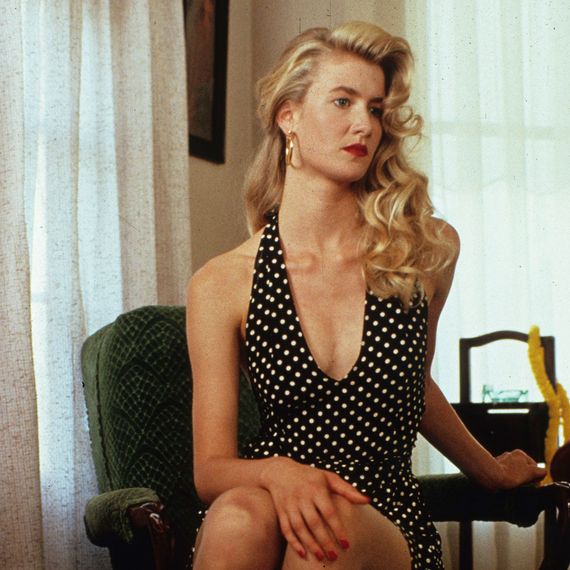
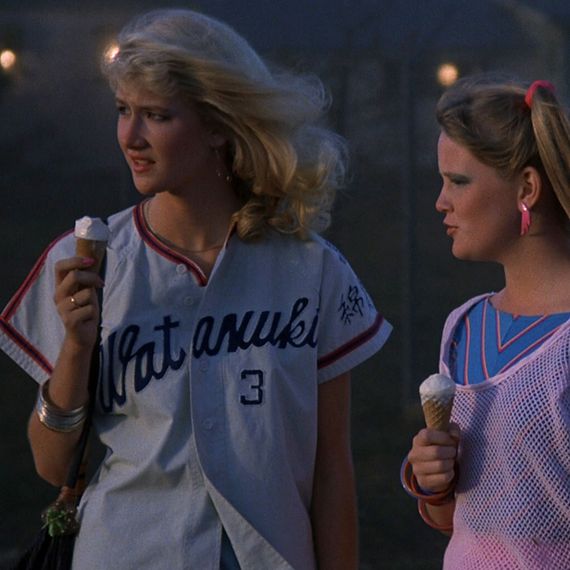
It’s also interesting to put them in context with the 2018 film The Tale, which was based off of the filmmaker Jennifer Fox’s experience reflecting back on what she thought was a consensual relationship when she was 13. She comes to realize, as an adult, that it’s not. Did doing that film help you recontextualize certain scenes you did, or your career?
I mean, certainly it added to it. Life changes our stories. Like, oh now I’m 40, and he wasn’t a nice person. I actually forever have justified that behavior and said, “No you don’t understand,” like “He came from addiction” or “That was complicated,” and you sit with a girlfriend who is now 40 and say, “No, I was abused. That’s what happened in that relationship.” We all have those stories, whether they’re ours or our friends, our lovers, our sisters. We now are grown-ups looking back. So life has taught me a little bit more about boundaries in what I would say was a pretty boundaryless world — an artist’s world anyway — and starting young and seeing a lot, and luckily being protected. But still seeing a lot.
A couple of years ago we celebrated the 20th anniversary of Ellen DeGeneres’s “The Puppy Episode,” in which she came out, both as a character on the show, and as a person to the country. You played Susan, who is an out lesbian and helps Ellen realize she’s gay. You’re the focus of attraction. It’s a pretty pivotal character, and I wanted to hear the backstory of how that happened, and your own reaction to the ask.
Greatest thing I could’ve ever been part of, honestly. An incredible honor. She was a big fan of Citizen Ruth, and she asked me, would I come join this effort? Not just to play a role, because there were several of us. Oprah, who played her therapist in the episode, obviously the cast of her show. I was excited. I didn’t think twice about it. It was a great opportunity. And then the calls started coming in once I’d said yes, from a couple of advisers in Hollywood who were out gay men, [telling me] to not do it. A lot of people in my life really worried. And I was like, “This is ridiculous.” This is where I grew up in a bubble and didn’t realize we weren’t there yet or something. The first time I became aware was, Oprah and I were having a snack, and suddenly a flood of cops swarmed the set and the stage while we were rehearsing. They’re like, “There’s been a bomb threat, we’re sweeping the stage.” And they start literally rushing us off the stage.
We only did it for what, ten days? We all spent the next couple of years really struggling in work and safety. It was radical to experience that. It was the only time I ever experienced having to have to have full security detail. But what was amazing, which I will never forget, that when she looked in my eyes, she said it was the first time she said “I’m gay” out loud. We didn’t rehearse it, so when she said it to me, and was looking in my eyes and holding my hands and I felt her shaking … the gift — it makes me want to cry — the gift of that, the intimacy of what that means, was such insight for me. And I’ll carry it for the rest of my life. It’s shaped and continues to shape who I am as an advocate, as an activist, as a parent. It’s a profound thing when you see someone bring their truth, but also all the layers of shame and fear that have been put onto you because of feeling like the other, whatever your experience is. So I’m forever grateful.
My understanding is that you didn’t work for a year after that. Was that the most significant dry spell in your career?
It was significant. It was significant because I was doing successful independent movies, and, only months before that, I was in Jurassic Park, the most successful movie ever. So it was like, you’re being offered this, you’re being offered that — and it just stopped. Which is kind of wild. By good fortune of the long path of a career, you can look back and say, how great to have it be felt, how backward we are. I took time off when I had my son, and I feel like, in a way, it gave room for less opportunity. I will say, for women, it’s hard to take time off by choice, because then you feel like you have to start all over when you’re coming back to something.
Did you ever wonder what your career would be like if you were male?
I had done a screen test for a movie with a great actor who I really admired. I was in my early 20s, and he said, you remind me of Charles Laughton. I was taken aback. I didn’t love that until I realized that was just the most incredible compliment ever, as I learned more about Laughton and his ability to transform and play so many different characters. So many of us females would’ve had a lot more opportunity a lot younger to play the mess.
I remember when I started doing press [for Enlightened], my first interview was with a female journalist, and she was like, “Ew, how are you comfortable playing someone so ugly? Like are you sure you want to do that? And how did HBO decide to do that? I mean she’s angry all the time, she’s so unlikable. Anger on a woman, I don’t know.” And while she’s saying this, we had just started the other show on HBO, which she then touted as extraordinary, [starring] this sexy iconic male. His name was Tony Soprano. But I was mad, so I was gross. That’s incredible, isn’t it? So, yeah. I think I could’ve been Tony Soprano if I were a guy. Or Tom Hanks, who can be affable and a beast and adorable. It doesn’t matter. There’s much more fluidity in the career of a male actor.
Do you feel like Enlightened happened too soon?
Yes. The idea was to make it, and then we’d all wake up and we’d see our cultural apathy so that we never again would let them get away with anything. This character [Amy Jellicoe] came to mind when I was working on a film about the recount, and I was like, “No one’s getting in the streets, no one’s irate, what’s happening? Where have we gone, where’s our determination, our marching, fighter spirit?” That feeling was like, well, who does? Who burns all bridges, becomes a whistle-blower, doesn’t care if her family hates her? She may be complicated at home, but she will get in the face of corporate America and say, “No more, I’m exposing you.” That was the idea. And the people who enjoyed it were like, “Oh yeah, we’re there.” But now, this year, this moment particularly, everywhere I go, people are bringing it up, like, “Oh my God, I just found Enlightened, we are Amy Jellicoe. We are all Amy.” There’s more fighter spirit and revolution awake in us because we really are, in the quote of Paddy Chayefsky from Network, mad as hell and we’re not gonna take it anymore. And that’s great news. That’s why Enlightened is a good fever-pitch place to go when you’re feeling like her, which I do a lot of the time.
Would you bring the show back?
We talked about it. [Co-creator] Mike [White] and my fantasy always was three seasons, and we only did two. There was a real mapped-out third place to go. It was a very different show, which now is very normal. But it seemed so radical only a few years ago. The bummer was we got cancelled based on live ratings, because that’s the way we measured TV. And a year later, we were measuring TiVo ratings. And now, luckily, all of it’s in the algorithm, and so all these companies can know success based on the fact that some people watch it eight months later, some people binge-watch.
About six months later, we had an incredibly successful show. Three months after the decision, Time magazine named it the best television show ever. And it was just crazy. And then all the other reviews came out with top ten shows, and it was number one. Over Breaking Bad, which was a masterpiece, and shows that had immense success and many seasons. But if Amy were a male character …
You’ve worked with David Lynch over the course of a long period of time. How has your relationship evolved since you first met 30 years ago?
I was 17 on Blue Velvet. It just gets better and better. He’s incredible! He’s everything you want him to be. I’ll tell you the best story. We had one of the great nights of my life last weekend, where we gave out the honorary Oscars this year: the Governors Awards. David Lynch received one, and myself, Kyle MacLachlan, and Isabella Rossellini gave him his Oscar. The whole room goes insane. The quintessential moment I’ve had with David in all of these years was, he was holding his Oscar, and we walked back for a smoke. He needed a smoke. And as we went outside, he was holding it and I said, “How do you feel?” and he goes, “Wow, this is so pretty. But you know, we’re just lucky.” Which people say, you know. And I was accepting it in the way I’ve heard other people say it. He goes, “I mean, Tidbit, they’re not our ideas. We’re just lucky if we catch them.” And I’m just like, “Yeah, well, that’s David Lynch.” They’re not our ideas. Things move through us. We didn’t make them up. I just think that’s really beautiful.
So when he begins Twin Peaks: The Return, for instance, does he just call you up? Do you go to the Chateau Marmont and does he just pitch you, “Hey, I wanna bring the show back”?
You go to his house for a cappuccino, and he says, “You’re gonna do something, I can’t tell you what it is. But I need you to find a leopard coat from a thrift store, and you want a yellowish-white lipstick.” I was like, “Okay, how do you want my hair.” And then he started to describe my hair, and I was like, “What is it for?” “I can’t tell you!” “Is it a movie?” “I can’t tell you!” Um, “What does the character …” [Laughs.] So that’s where it began. And I got to the thrift shop, and I came back and I tried wigs on for him, and then we started building. Then he gave me a sense of my scenes, then I realized who I was playing, which was kind of fantastic. And to play a character that was so known from Twin Peaks …
But never seen.
But never seen, was amazing. I basically just spend my time saying “fuck you” a lot. And it was amazing, and to be back with David and Kyle and, you know, Naomi Watts. It’s a family. We all get to just be together, whenever he’s ready to play again.
That’s the most you’ve acted in scenes with him, right? What was that like?
So intense. It was amazing and fun and hilarious, and we had my favorite moments in it. But we also had this very violent moment together, and I have to tell him this very emotional monologue and then get shot at the end of it. We did it in one take, and I just like was locking eyes with him, telling a long story to him of how this thing happened. It was so wild to be looking in the eyes of the person who’s been directing me, right here, for so many years.
I did want to get your thoughts on the conversation Martin Scorsese began when he said Marvel movies aren’t cinema. As someone who has done franchise films and independent work, where you do you fall on what’s happening in movies? In some ways, it feels like an actor needs to do both to stay relevant.
Well, he’s a genius and he can say whatever he wants. And I will listen. They did that beautiful documentary about the ’70s, and at end, he said, “I miss the people.” I would think that’s what he’s speaking to in the comment. There’s a lot of worry about people not going to the cinema for the people. I mean we’re here promoting this movie, Marriage Story, and it’s such a beautiful movie, and I have loved being at the screenings so that I can be in the cinema with other people, sharing the heartbreak of longing and divorce and a love story and childhood and all the things that Noah explores. The reminder of sitting in a cinema, just to have this churchlike experience of experiencing something together. And a spectacle is different. It gives you a different experience. A horror film, a Marvel film, a Star Wars film. And I love all of it. Being in Star Wars, are you kidding? Having the great pleasure, as an actor, as a human being, to see Adam Driver in Marriage Story and Adam Driver play Kylo Ren? I want him to do both of those things. He’s brilliant. And they’re brilliant in totally different ways.
But, if I may, one thing he points out that is important is, you know, franchises buy out your multiplex, and then, yes there are films we see at home, but we don’t want to lose church. We have this film Little Women coming out, Christmas Day! We want to go and have that experience with that shared collective. I do think that’s a big worry. And I’m so grateful for Netflix, who is protecting the Paris Theatre and making sure that their auteurs are getting the release they want, which was very important to Noah, very important to Marty Scorsese. Our movie’s going to be in theaters for a month, guaranteed, before it livestreams. So, we’re all finding what the balance is, and how to do this, so that we can keep these stories alive forever, and movie theaters alive forever.
Last question. An easy one. Which Big Little Lies character are you?
I probably was Jane, and if we ever did it again and it gets in me even a little bit more, I’m becoming Renata. Because I so agree with her on so many fronts. We all need Renata in us somewhere. That line, “I will not not be rich” — people come up to me all the time quoting [it] now, but they say it as though it’s theirs. I’ve had other lines from movies, where people are like, “Oh I love when you said dadadadada,” or, “when your character did that.” They come up and go, “I will not not be rich!” in my face. I’m like, “You needed that. It’s not mine, it’s yours.” It’s everybody’s, which is what’s great about Renata. She’s waking up the things we want to say but don’t.


